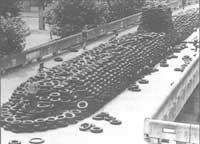Convert plastic waste to fuel
1993/03/01 Elhuyar Zientzia Iturria: Elhuyar aldizkaria
Some of the plastics that are deposited in landfills can become fuels. Those based on chloride are the objective of the process invented by the Japanese company Toshiba. Thermoplastics based on chlorides, such as PVC, cannot be treated by current processes, as they emit toxic components, i.e. hydrogen chlorides.
In plastics approximately 20% are chloride thermoplastics and most thermoplastics do not break down on their own.
The Toshiba process has the advantage of being able to use it in all types of thermoplastics. However, epoxy resin, a common component of residual plastics, cannot be decomposed and must be removed. This is one of the most difficult obstacles to recycling plastics. In the Toshiba process thermoplastics are sprayed and then introduced into an oil bath and heated to 400°C, decomposing at this temperature. At that time sodium hydroxide is added to the mixture. This hydroxide captures chlorine and produces sodium chloride.
At normal atmospheric pressure the plastic breaks down forming carbon chains of different lengths. The carbon chains that are generated in a reactor with a pressure ten times higher than the atmospheric are six to eight. Gasoline and diesel have hydrocarbon chains of this size.
According to Masao Koiama, director of Toshiba's environmental engineering laboratory, the energy the system uses is one-third of the energy it provides at the end of the process. Therefore, the commercial feasibility of the process is demonstrated.
However, Koiama stresses that the results are laboratory. The commercialization of the system will take a couple of years.

Gai honi buruzko eduki gehiago
Elhuyarrek garatutako teknologia




